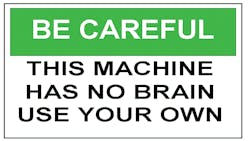The Basics Of Shop Safety
This month, we would like to discuss a topic often overlooked – shop safety. Oftentimes, shop safety takes a back seat to the job at hand due to time constraints, work load, etc. Then an accident or injury occurs. Now it’s too late to look back and say “what if? “ We have some simple areas to focus on to help make your work environment a safer place.
Personal Protective Equipment ( PPE )
This includes welding equipment, such as a welding helmet and welding gloves for any type of welding (arc, mig, or tig ). Tinted glasses, a face shield, and leather gloves for cutting torch or grinding work is a must as well.
However, make sure not to wear a cotton or fabric-type glove when using a wire wheel as the wheel can easily snag the glove and pull your fingers right in. Rubber gloves and a face shield should be used whenever working with harmful or caustic chemicals. Sturdy leather boots (preferably steel toed ) should be standard required footwear in any shop.
Housekeeping
A messy shop not only looks bad and is a pain to work in, but is also dangerous. Most injuries are preventable and many can be attributed to poor housekeeping. This leads us into our next topic…
Slips, Trips And Fall Hazards
Slips, trips and falls are the major source of workplace injuries every year. The sad thing is, they are virtually all preventable.
For example, fluid spills should be cleaned up as soon as possible. Air hoses should be rolled up when not in use. Extension cords should only be used temporarily and then stored in the proper place. All tools and miscellaneous parts should be kept off of the shop floor. During icy conditions, all walkways should be covered with an ice-melt material and people should walk with short, deliberate steps. Anti-skid tape or coatings can also be used on smooth steps or surfaces.
Lockout – Tagout
Whenever a machine or piece of equipment is broken or in for scheduled service, an out of service tag should be affixed and the unit should be disabled mechanically or electrically. If a repair or service lasts until the next shift begins, then it should be communicated to the guys starting work. This includes removing any lockouts in place and allowing the following shift to install their own.
Pre-shift Safety Briefing
This can be a quick, 10-minute meeting prior to the start of every shift to outline the planned work activities of the day. This should include any procedures, tools, and logistics needed to complete any tasks. This way, everyone is on the same page and knows what is expected of them as well as when and in what order things will happen. This also serves as a good time to assign tasks for the day as well.
Elimination Of Unsafe Acts
Sometimes, people think that the rules may not apply to them or that it is OKto bypass a safety rule to make a job easier or to save time. This is dangerous thinking. How many times has a supervisor heard this:
“ I was only grinding for a few moments.”
“ I didn’t think that the safety glasses were really necessary.”
“ I meant to clean up that oil puddle as soon as I finished but got side-tracked.”
People who take unnecessary risks are not only a danger to themselves, but to others as well. It is bad enough to make a careless mistake that injures yourself, but do you really want the injury of a fellow co-worker on your conscience? We hope not.
Attitude And Awareness
Have you ever been at work with a co-worker who is under a lot of stress due to personal or financial problems? Has that person ever been you?
Problems with home life or finances can surely place a heavy burden on someone’s piece of mind. Some people can cope with it better and are more apt to leave “ work at work” and “home at home.” Some people however, cannot.
As GSE maintenance supervisors, it is our responsibility to safeguard our people as well as our equipment. If you see an employee struggling mentally due to outside stressors, take the time to speak with them about the issue. If they are unable to discuss the matter or are in a really poor state of mind, then maybe removing then from the workplace would be the answer.
It’s better to lose some production and a little pay for a day than to damage equipment, have an injury, or worse. If an employee has other things on his mind, he may not have the proper amount of awareness both in the shop and on the ramp, which can prove disasterous. Complacency in the workplace is a killer that we can all do without.
The workplace environment in which we work can be an interesting, exciting, and yet dangerous place. It should be our ultimate goal each and every day to not only get the job done, but to do our best to ensure that our guys go home safely to their families at the end of the day.
About the authors: Kenneth DeVolpi, manager of GSE and operations, has worked for Matheson for more than four years and has been in the aviation industry for more than 25 years, including 15 years with Northwest Airlines. Jason Chapman works in the company's GSE maintenance department and gained GSE mechanical experience with the U.S. Air Force and has worked in the commercial GSE industry for 12 years.
